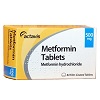 Pill Categories
Pill Categories
Metformin
 |
Metformin is a biguanide antidiabetic that is used to treat type II diabetes. It works by reducing the amount of sugar that the liver produces and the intestines absorb. |
PRODUCT DESCRIPTION, SAFETY, ETC View product image
Metformin 850 mg
Metformin 500 mg
| Package | Price | Per pill | Save | Order |
|---|---|---|---|---|
| 360 pills - 500 mg | ₣74.11 | ₣0.21 | ₣30.90 |  |
| 180 pills - 500 mg | ₣40.91 | ₣0.22 | ₣11.59 |  |
| 90 pills - 500 mg | ₣26.25 | ₣0.29 | — |  |

PRODUCT DESCRIPTION
Drug Name
Metformin
Drug Uses
Metformin is a biguanide antidiabetic that is used to treat type II diabetes. It works by reducing the amount of sugar that the liver produces and the intestines absorb.
Mode of Application
Metformin can be taken by mouth with or without food to avoid an upset stomach.
Take it for the entire duration of treatment preferably at the same time everyday.
Do not stop without consulting your doctor.
The best way to use the drug is as recommended by your doctor.
Drug Class & Mechanism
Metformin is a biguanide antidiabetic that is used to treat type II diabetes. It works by reducing the amount of sugar that the liver produces and the intestines absorb. It also enhances the sensitivity of the body to naturally occurring insulin.
Missed Dosage
If you miss a dose of Metformin and you are on a regular dosage then you may take it as soon as you remember and adjust the remaining doses accordingly. However, if it is nearly time for the next dose then you may skip this dose and continue with the regular dosage. Do not take a double dose to make up for the missed dose.
Storage
Store it at room temperature (between 68 and 77 degrees F (20 and 25 degrees C) in an air tight container protecting it from direct exposure to light, heat and moisture. Keep away from pets and children.
Precautions
Discuss with your doctor about any prior medical condition that you may have including allergies to medicines, food or other substances.
Metformin may cause dizziness. These effects get aggravated if you take it with alcohol or certain other medications (sleep aids, muscle relaxers). So, do not drive or perform other potentially hazardous tasks until you know how your body reacts to the drug.
Reduce your alcohol intake.
Avoid getting dehyrdrated while using Metformin. Drink plenty of fluids.
You must not take Metformin if you are allergic to any ingredient in it or you have congestive heart failure that is treated by medicine, you have a severe infection, low blood oxygen levels, kidney or liver problems, high blood ketone or acid levels (e.g., diabetic ketoacidosis), or severe dehydration, you have had a stroke or a recent heart attack, or you are in shock, you are 80 years old or older and have not had a kidney function test, you will be having surgery or certain lab procedures.
If you are pregnant or suspect that you are, then stop using Metformin and contact your doctor immediately.
It is unknown whether Metformin is secreted in breast milk. Avoid breast feeding while using the drug.
Certain drugs can interact with Metformin and hence, mention clearly to your doctor or pharmacist all medicines, dietary supplements and herbal prescriptions that you are taking.
Metformin may affect your blood sugar level and may make you feel confused, drowsy, or thirsty. Contact your doctor immediately if these symptoms occur.
It is a good idea to carry a reliable source of glucose (e.g., tablets or gel) to treat low blood sugar. If this is not available, you should eat or drink a quick source of sugar like table sugar, honey, candy, orange juice, or non-diet soda. This will raise your blood sugar level quickly. Tell your doctor right away if this happens.
Metformin should not be used in children younger than 10 years of age as the safety and effectiveness of the drug have not been confirmed yet.
Ensure that you inform your doctor and your dentist about Metformin before receiving any form of medical treatment or dental treatment or emergency surgery.
Periodic lab tests including kidney function, fasting blood glucose, hemoglobin A1c, and blood counts may be recommended to monitor your health while taking the drug. Ensure that you do not miss any lab tests.
It has been noted that elderly patients are more sensitive to the side effects of the drug. They might need a dosage adjustment or special monitoring throughout the treatment.
Side Effects
Some of the common side effects of are Diarrhea, gas, headache, indigestion, nausea, stomach upset, temporary metallic taste, vomiting. Please contact your doctor if the symptoms persist or become bothersome.
Other severe side effects include allergic reactions (rash, hives, itching, difficulty breathing, tightness in the chest, swelling of the mouth, face, lips, or tongue), chest pain or discomfort, dizziness or lightheadedness, fast or difficult breathing, feeling of being unusually cold, fever, chills, or persistent sore throat, general feeling of being unwell, muscle pain or weakness, slow or irregular heartbeat, unusual drowsiness, unusual or persistent stomach pain or discomfort, unusual tiredness or weakness.
You must seek medical attention immediately if any of these side effects occur.
| Home Contact us Delivery Control Discounts Sitemap | Terms of service | Money back policy | Privacy policy |








 Live Chat 24/7
Live Chat 24/7





